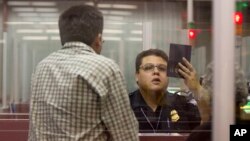The United States plans to stop issuing visas to citizens from four countries that it says aren’t accepting deported citizens.
The list includes three African countries — Eritrea, Guinea and Sierra Leone — as well as Cambodia. The U.S. has suspended visas twice before under previous administrations in efforts to push deportations forward.
Last week, the Department of Homeland Security notified the Department of State that the four countries are refusing to accept or are unreasonably delaying the acceptance of nationals deemed to be in the United States illegally, a violation of section 243(d) of the Immigration and Nationality Act.
Now, the State Department is evaluating how to implement the order.
In the past, visa suspensions have targeted diplomats and government officials. How many people this suspension will affect has not yet been determined.
“We follow a standard process to implement a visa suspension as expeditiously as possible in the manner the secretary determines most appropriate under the circumstances to achieve the desired goal. That process includes internal discussions with, and official notification to, affected countries,” a State Department official said in an email to VOA.
Targeted countries react
Mamady Condé, Guinea’s ambassador to the United States, told VOA’s French to Africa service by phone that his office has not yet received an official notification, and he learned of the news through the media. He said 75 Guineans have been deported, but he did not specify in what time period. He added that about 2,000 Guineans live in the United States illegally.
Bockarie Kortu Stevens, Sierra Leone’s ambassador to the U.S., said his country has cooperated with all deportation orders. Since January, he said, two charter flights operated by the United States have returned 30 to 40 Sierra Leonean nationals.
“They put them together with [deportees from] other countries, and then they take them to Sierra Leone, and we have been cooperating with them,” Stevens told VOA.
Sierra Leonean embassy officials said they go to holding cells to interview people slated for deportation to confirm their nationalities.
“Once they've been identified as bona fide Sierra Leoneans, we issue the relevant travel documents, and it’s up to the United States authorities to affect the deportations,” Stevens said.
He rejected the notion that many or most Sierra Leoneans are in the United States illegally. According to the State Department, 46 Sierra Leoneans have received deportation orders this year, including 22 criminal deportations. Most deportees have committed drug crimes, Stevens said.
“Of course, like with any society, you have people who want to bend the rules. So, those who bend the rules, they face the consequences," he said. "But the majority of Sierra Leoneans are law abiding, and many of them who came here as a result of the war are fully integrated into an American society."
According to Census data, about 49,000 Sierra Leoneans live in the United States.
Eritrean officials in Washington, D.C., and Asmara did not respond to interview requests from VOA’s Tigrigna service.
Cracking down on violent crime
So far this year, the U.S. has ordered the deportations of 117 Eritreans, 88 Guineans and 27 Cambodians, according to State Department figures.
But that’s just a fraction of the total deportation orders issued, including more than 28,000 Mexicans who have received deportation orders.
Cracking down on illegal immigration was a signature issue of Donald Trump’s campaign and is now of his administration. By instituting visa suspensions, the United States hopes to deport individuals convicted of violent crimes.
Most foreign nationals designated for deportation or issued a removal order, however, were not convicted of criminal offenses, and most criminal deportees are nonviolent.
In 2015, more than 60 percent of foreign nationals removed for criminal offenses committed immigration, dangerous drug or traffic offense crimes, according to Homeland Security figures.
Idrissa Fall contributed to this report





